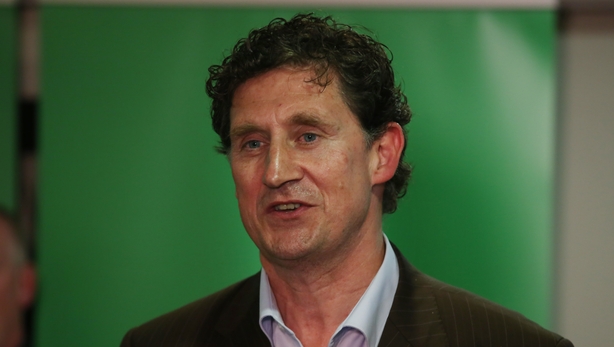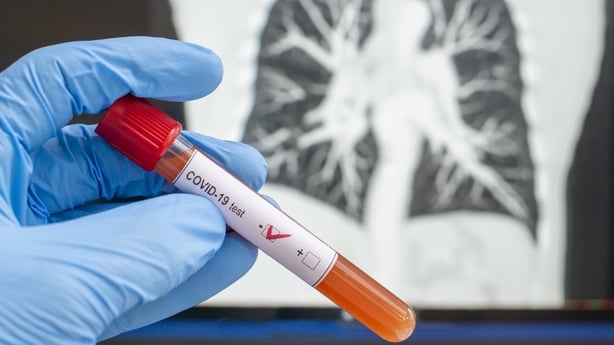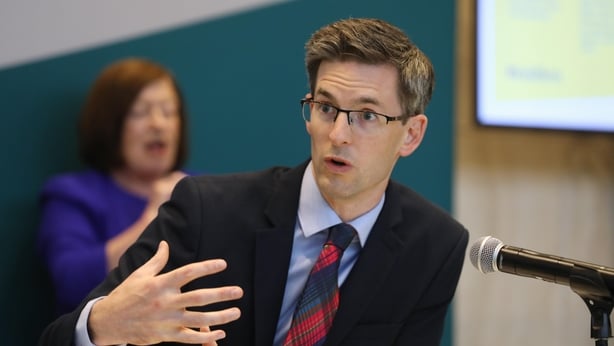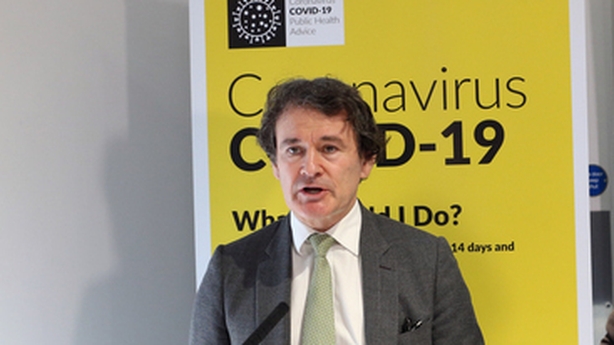What a rollercoaster seven days it has been.
Things move so fast in Covid-land, that the start of any week is barely recognisable by the end of it.
And each and every one of us is a hostage to this crazy fairground ride, minus the fun element.
We had the three-county lockdown for Kildare, Laois and Offaly. Then 200 cases reported this day one week ago, which shocked many people.
A testy Cabinet meeting was followed by the Government introducing a raft of new restrictions. Then the resignation of the Minister for Agriculture, and the Seanad Leas-Cathaoirleach, over the now infamous Clifden golf event.
If the coronavirus crisis continues, and there is a general election here, wouldn't it be a fascinating outcome if there had to be a first-time ever postal vote (with physical voting ruled out due to social distancing).
It could result in the biggest turnout of all time. And what would that mean?
Also this week, Green Party leader Eamon Ryan admitted there were contradictions in some of the new Government measures. A wedding could proceed with 50 people but a kid's birthday party at home could not have more than six people invited.
At times, it seems as though the confusion is nearly as bad as the restrictions, for some people. The world can be a frightening place when things stop making sense.

Those involved in cultural events also had a torrid time this week. The drama over whether they could have 50 people, or just six people in a theatre, had more twists and turns than a Shakespearean play and seemed to run longer than most West End shows.
Two Government departments - Culture and Health - issued different positions on whether theatres could host gatherings of 50. It was the stuff of pantomime but no joke, given that people's livelihoods are at stake here.
Finally, the Taoiseach delivered clarity and relief for the organisers of important cultural events around the country.
We are six months on from the start of the impact of the pandemic here and everything seems on edge. It has been a very difficult and anxious time, full of uncertainty, apprehension and anxiety.
Opinions appear more divided now on how to proceed than at any time during the crisis, that I can recall. Perhaps that’s understandable.
There is a fracture in the consensus on dealing with Covid-19 at the political, societal and individual level. It’s not irreparable. But it will require healing, if we are to journey safely through this.
The horror mix of the threat of Covid-19 and the shocking weather did not help the national mood. And while public information is important, those incessant 'message adverts’ on radio, repeating the measures and advice, ad nauseam, can get a bit irritating. There are so many messages to absorb now, people can get lost in the messages.
We are told that testing and tracing is being ramped up. It should never be ramped down. Coronavirus is just waiting for any cracks in our defences.
There is no escaping the constant talk about the virus, unless you go for a good long, solitary walk. Like Charlie Bird in the Wicklow mountains.
The HSE came under intense fire over its testing and tracing system this week. It has been doing about 55,000 tests in a week, the second highest level since the peak of the pandemic in April, during the first national lockdown.
There was a claim that the test and trace system was falling apart. Paul Reid, the HSE Chief Executive, rejected the suggestion and called it alarmist and unhelpful.
He appeared confident that the HSE could meet the capacity of 100,000 tests a week, if necessary and also meet the turnaround target. Let’s hope he is right but no-one hopes it ever gets to that point.
There are some fundamental issues about testing and tracing here and where we are now. The World Health Organization has emphasised the fundamental importance of test, trace and isolate.
Remember the famous words of the WHO’s Director General Dr Tedros Ghebreyesus on 16 March: "Our key message is test, test, test."
As some test turnaround times have drifted to taking many days to complete the process, some people have appeared to play down the importance of testing and tracing.
The word "outliers" is being used to describe cases where people are waiting well beyond the test and trace target times. While there may be reasons for these ‘outliers’, might the word ‘failures’ be a more apt description?

We are told that testing and tracing is being ramped up. It should never be ramped down. Coronavirus is just waiting for any cracks in our defences.
We learned this week that some staff involved in the testing and tracing service, who had been redeployed, had been returned to their original work roles. That’s like taking guards off sentry duty during a war.
The Government has promised that the test and tracing system is up to the task. And that the funding is there to meet whatever is needed. The turnaround times from referral for a test, to all contacts being rested and given their results is put at 2.3 days now by the HSE.
However, that figure includes hospital testing, which is very fast and brings down the overall turnaround time. The major focus must really be on the community test turnaround time and getting this to the fastest level possible.
The facts show that the growth in cases is among those under 45 years.
We also heard this week about language issues in contact tracing, which can delay getting some key details, in particular relating to meat factories and Direct Provision centres where English may not be the first language for some people.
How can this be a reasonable excuse? Ireland is and has been a multicultural society for many, many years.
These things should not be a surprise and there should have been provision to deal with the fact that perhaps 29 different languages may be involved.
Excuses have also been made about the conditions in some meat factories and Direct Provision centres, which have been known for years. These issues contributed to the lockdowns for Kildare, Laois and Offaly.
This week, older people were being told to try and stay at home as much as possible and adopt new measures. Given that the over 70s have been among the most compliant group in terms of honouring the restrictions, it was a bitter pill for some older people to swallow.
The facts show that the growth in cases is among those under 45 years.
The Covid-19 Nursing Homes Expert Panel Report was published this week. The panel was set up in June, after a recommendation from the National Public Health Emergency Team.
While the publication of the report is welcome, the more important event will be if and when all of the 80 recommendations are implemented.
On that point, the report did not go to Cabinet and it has also yet to be costed, so those are major caveats. There is also to be an implementation group set up so only time will tell if another health report gathers dust on the shelves of the Department of Health, faces partial implementation, or is actually embraced with gusto.
The good news is that the number of cases in hospital remain relatively stable. The R number is at or above 1.2. And for the most part, people are following the public health advice.
Despite everything, Ireland is still in a relatively good position compared with some other countries.
We also saw the results of an important study of the rate of infection of Covid-19 in the Irish population. For the research, blood tests were taken from a random sample of 1,733 people aged 12-69 years, in Dublin and Sligo in June and July.
It revealed a prevalence of infection of 0.6% in Sligo and 3.1% in Dublin. Loss of sense of taste or smell was seen in a third of cases of people with antibodies.
Let's hope the lessons of the first six months of this virus have been learned and there is a uniform approach to dealing with cases in schools
The bottom line is that the national prevalence rate is 1.7%. It means that an estimated 59,500 people had been infected with the virus up to mid-July.
That was three times more than the officially notified cases at the time. The official number of cases as I write this is 27,755. So on that basis, possibly around 83,000 people in Ireland have been infected with coronavirus.
The next big test for the Government will be the reopening of schools and the issuing of the Leaving Certificate Examination results, with the new assessment process.
Given all that has happened in recent weeks, the public will not tolerate any failures in these areas. Let’s hope the lessons of the first six months of this virus have been learned and there is a uniform approach to dealing with cases in schools, based on the public health advice.
Parents and students have been through enough, to have to endure further problems in these areas. How school outbreaks are managed will be important from day one and will set the tone for what parents can expect as things progress.
While most of the talk is about Covid-19, the health service is still trying to get non-Covid-19 services back in action. The hope is that 90% of day services will be open by the end of this month.
However, services will operate at reduced levels. This has been a very difficult time for older people who rely on day services and also those with disabilities.
Organising transport to and from day services has been a challenge. While some progress is being made on day and inpatient waiting lists, referrals for outpatients are up. The HSE is working on a Winter Plan, which it says will look like no other plan it has ever produced.

The National Public Health Emergency Team is now probably the most well-known body in the country. It was set up in late January to deal with coronavirus.
While a NPHET had previously been convened to deal with healthcare infections, it was a largely unknown entity then. Now, NPHET is the most famous acronym in Ireland and some of the members are almost as famous as a top rock band.
Some have become stars in their own right, with all that comes with being at the centre of the public and media eye.
When the acting Chief Medical Officer Dr Ronan Glynn came under some criticism during the week, over the fresh restrictions recommended, his fellow NPHET member, Dr Cillian De Gascun, came to his aid.
Dr De Gascun posted a social media tweet of the famous ‘O Captain ! My Captain’ scene in Dead Poets Society. It’s a homage to the Walt Whitman poem about a captain who dies as his ship reaches the end of a stormy and dangerous voyage.
#SARSCoV2 #COVID19 https://t.co/3R1U3setzd pic.twitter.com/hTqY0mhJ24
— Cillian De Gascun (@CillianDeGascun) August 19, 2020
There is a danger of losing public support for some measures as time goes on, if those measures are not seen to be logical. No doubt in sensing this, Dr Glynn issued a five-minute social media video, on his own, to try and give better context and explanation for why we are, where we are.
On the subject of voyages, another person on the move shortly is Paul Connors, the director of communications for the HSE. He has been in that testing role for 12 years and is well known among health journalists.
Recently he became familiar to the public, as the person who introduces and moderates the HSE Covid-19 media briefings broadcast on RTÉ News Now and on social media.
As a journalist, I would regularly wake him up very early in the morning with queries before going on Morning Ireland and often pester him late at night, just when he thought he could relax and dive into re-runs of The Thick of It with Malcolm Tucker on TV.

The nature of the HSE is that it has to deal with media queries on an almost 24-hour basis. Just as the CervicalCheck crisis was abating somewhat, coronavirus came knocking.
Paul is a former army man, genial but tough and he made the most of his military skills, in the sometimes dark art of media communications. Now he is moving in October to be a devil in the law library. Whoever takes on his job at the HSE will need a Kevlar suit.
This has been a harrowing week for people. Most citizens have been doing their best to follow the guidance from Government. But now there are threats again of a possible second national lockdown. It won’t be due to any general failure by the people.
Health officials have identified what they say are contributory causes – outbreaks in the food sector, in Direct Provision, a growth in household cases, some house parties, some social engagements and sporting activity and some delays in testing and tracing.
We appear to be heading in a bad direction with coronavirus but there is time for a course correction.
On this trip, there can be no latitude for failure.
In stormy waters, you look to the captain to navigate safely.
A nervous captain makes a nervous crew.
So it’s time to steady the ship.







